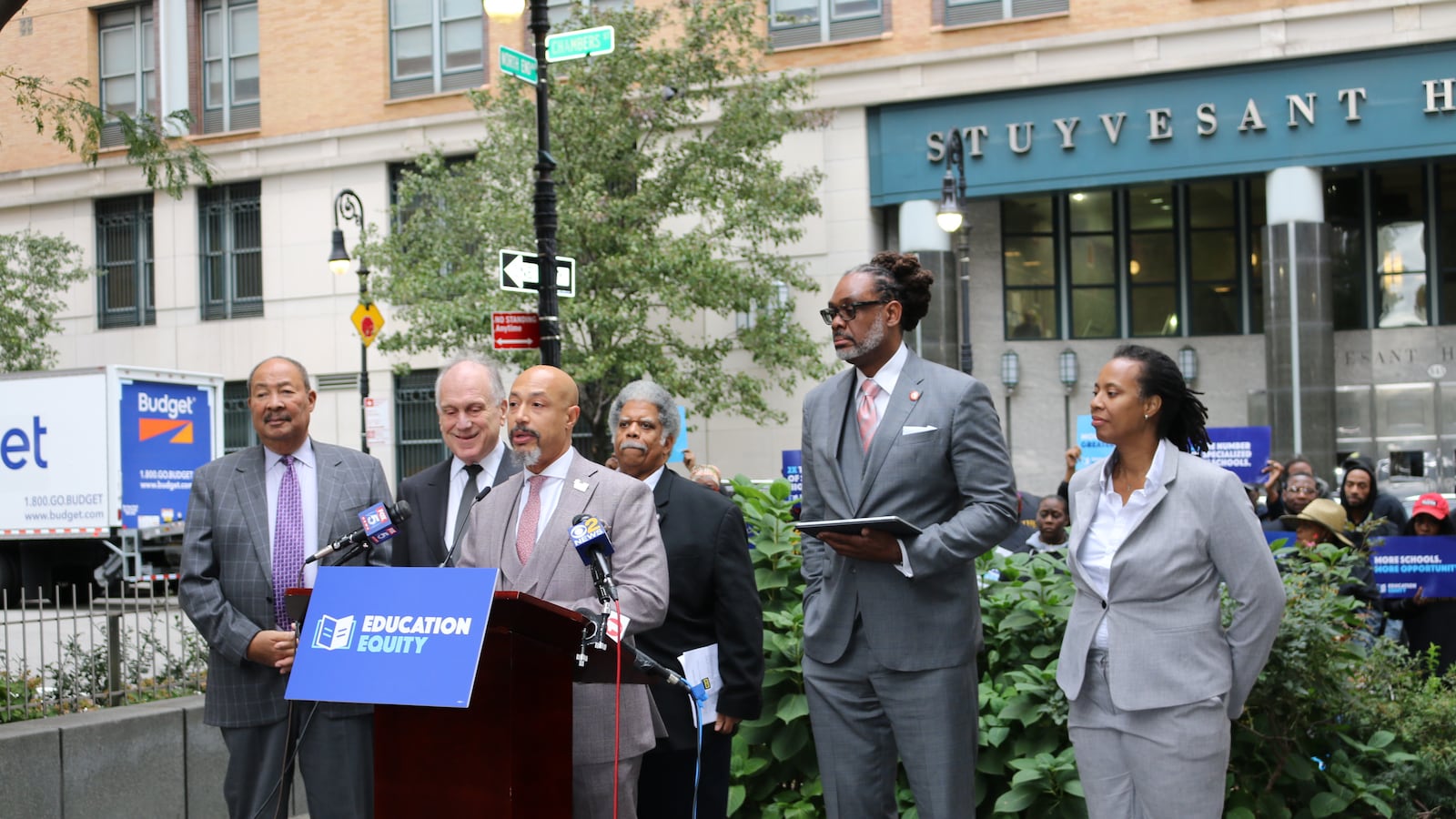The Education Equity Campaign, a well-funded group determined to keep in place the specialized high schools admissions exam, is again taking its fight to Albany — throwing support behind a bill that calls for creating 10 new specialized high schools and expanding subsidized test preparation programs.
New York City’s elite specialized high schools are under pressure to diversify their largely white and Asian student bodies. Mayor Bill de Blasio proposed scrapping the controversial SHSAT entrance exam, in favor of admitting the top 7% of students at all middle schools, but he recently signaled the need for a new strategy.
During a Thursday press conference in front of Stuyvesant High School, in Lower Manhattan, Education Equity backers said they would support diversity instead by continuing to push for more publicly funded test prep opportunities and for the expansion of gifted and talented programs in city elementary schools, even as a diversity task force is recommending those programs be phased out altogether.
“The last thing we need to be doing right now is reducing the standards of excellence that we demand at our schools,” said Richard Parsons, former chairman of Citigroup and Time Warner, and one of the key funders behind Education Equity’s multimillion-dollar campaign to retain the test.
The group’s public display of support for the SHSAT comes just weeks after de Blasio said the city should rethink its proposal to eliminate the exam, after it failed again in Albany. Next legislative session, New Yorkers could see a bill that would repeal the law that created the admissions exam, which would remove the state from making any decisions about how students get into these schools.
For its part, Education Equity will support a bill from state Sen. Leroy Comrie that would call for several things: Create 10 new specialized high schools; start a commission to recommend improvements to middle schools; expand public test preparation for every sixth and seventh grader, and make it standard for every eighth grader to take the test (with the choice to opt out); and open more gifted and talented programs. Comrie said the city “cannot dumb down” the system with its plan.
It’s not clear how any of these programs the bill proposes would be funded, though Comrie’s legislation says it would have no fiscal impact on the state.
Civil rights activist Rev. Kirsten Foy, one of the group’s backers, said the city “can find the money” in its $93 billion budget, but no one specified which current programs could be on the chopping block as a result. The education department’s annual budget is roughly $30 billion.
It’s also unclear whether Comrie’s proposals would succeed in diversifying the specialized high schools. For example, the city has slowly expanded free test preparation, reaching about 4,000 eighth graders this year, and says it reached out last year to 20,000 families in districts whose students are underrepresented at the specialized high schools. But those schools remain starkly segregated.
Critics of the SHSAT say the test bears some responsibility. The exam has been under severe scrutiny by those who say it’s a barrier for admissions that requires costly test preparation and keeps black and Hispanic children from earning their fair share of offers to these schools. This year black and Hispanic students received 10% of offers to the schools even though together they make up about 70% of students citywide. In contrast, 51% of offers went to Asian students and 29% went to white students, even though together they make up 31% of students citywide.
Asian and white families have argued that they, too, face financial challenges, and establishing the mayor’s plan would unfairly elbow them out of admissions.
Rather than change admissions requirements, “we’re trying to create a system that finds and locates talent where it exists, and talent exists across all communities — locates talent, nurtures talent, prepares talent, and then graduates talent,” Parsons said.
Since its inception in April, Education Equity has faced criticism as having an agenda that will work against black and Hispanic families because of its support of the test, and the group faced pushback for suggesting the city’s plan would water down the academic caliber at those schools. Parsons said that critique is “exactly the opposite of what we’re trying to do,” and later said the city’s plan felt like an “insulting” implicit assumption that students of color couldn’t do well on the exam.
The city shot back on Thursday. In a statement, City Hall spokeswoman Jane Meyer said, “our students deserve better than billionaires standing in the way of change.”
“A single test on a single day shouldn’t determine any child’s future, and adding more test prep isn’t the solution,” Meyer said. “We’ll continue to meet with communities across the City to chart the best path forward.”
Education Equity is notable for its mix of supporters and deep pockets. Parsons and Ronald Lauder, heir to the Estee Lauder cosmetics empire and a graduate of Bronx Science, have pumped “seven figures” into the group, said Foy, who declined to specify a number. A spokesman later said Education Equity has spent between $2 million and $2.5 million to date on expenses, such as advertisements, its test prep program, and lobbying efforts. And some of those efforts seem to have worked — with the bill to eliminate the test sparking a public hearing, several forums, and internal debate among state lawmakers, but ultimately failing.

